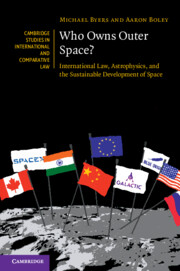Acknowledgements
This book is the direct result of our first meeting with each other, in November 2017. That meeting only took place because Philippe Tortell – who currently heads up the Department of Earth, Ocean and Atmospheric Sciences at UBC – knew of our common interest in the policy implications of human activities in Space. His introduction led to several sessions in a campus pub – followed by the creation of the Outer Space Institute, a number of co-authored articles, and then the writing of this book. For this, we are very grateful.
Numerous colleagues took time out of their busy schedules to read and comment on draft chapters. We are grateful to Adam Bower, Philip De Man, Gerhard Drolshagen, Steven Freeland, James Green, Brian Israel, Ram Jakhu, David Koplow, Paul Meyer, James Clay Moltz, Gregor Novak, Erin Pobjie, Haley Rice and Aaron Rosengren. Any remaining mistakes are our own.
Other colleagues shared their expertise in three workshops organised by the Outer Space Institute on core topics of this book. We are grateful to Timiebi Aganaba, Tony Azzarelli, Jennifer Busler, Jeffery Chancellor, Christopher Chyba, Mac Evans, Robin J. Frank, Brett Gladman, Veronique Glaude, V. Gopalakrishnan, Alice Gorman, Laura Grego, Andrea Harrington, Tanya Harrison, Paul Hickson, Yukun Huang, Tara Ivanochko, Moriba Jah, Catherine Johnson, Christopher Johnson, Phyllis Johnson, David Kendall, Elynne Kinney, Ryder McKeown, Xavier Pasco, MV Ramana, Melissa Rice, Sara Russell, Victoria Samson, Janis Sarra, Gregor Sharp, Ken Skublics, John Spray, Cassandra Steer, Lucy Stojak, Peter Suedfeld, Mark Sundahl, Gonzalo Tancredi, Brian Weeden, Jessica West, Paul Wiegert, Jan Wörner and Tanja Masson-Zwaan. We are further grateful to several individuals who attended these workshops, but whom we cannot identify by name.
We are thankful for the literally thousands of students who have inspired our thinking with their energy, ideas and tough questions. Some of those students contributed to this book in various ways as research assistants: Shahed Aljermashi, Andi Jordan, Rebecca Rogers, Paul André Narvestad, Logan Fladeland, Edmond Ng, Charlotte Hook, Sarah Thiele (who contributed to some of the analysis and plots), Ewan Wright (who likewise contributed to analysis and plots) and Val Muzik (who organised a pivotal workshop on Salt Spring Island in January 2020).
Andrew Simon-Butler deserves special mention, for editing most of the book and ensuring accuracy and consistency in the footnotes. Andrew Falle also deserves special mention, for serving as a research assistant and then as the research co-ordinator of the Outer Space Institute – running the show while his directors were absent for long periods of writing.
While a teenager, George Sipos aspired to be an astrophysicist before life took him in other literary and artistic directions. This book has benefited greatly from his interest and editorial skills. We are also grateful for the efforts of everyone at Cambridge University Press, especially Finola O’Sullivan, who commissioned this book shortly before her early retirement. She saw the potential in a transdisciplinary approach to these cutting-edge issues and guided the project forward with wisdom and enthusiasm.
Most importantly, we are grateful for the love, patience and good humour of our partners, Katharine Byers and Karen Samuel Boley (who both provided feedback on much of the writing and pointed out several opportunities for wordplay), and our children, Cameron, Fraser, Elise, and Noelle. Cameron initiated a father–son trip to see the first SpaceX launch-and-landing at Cape Canaveral in December 2015, thus sparking Michael’s interest in Space. Elise’s wonderful artwork graces the cover of the book.
********

